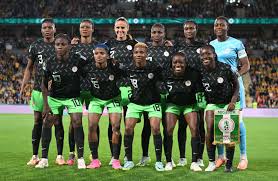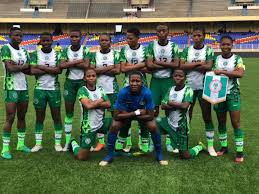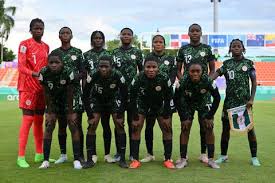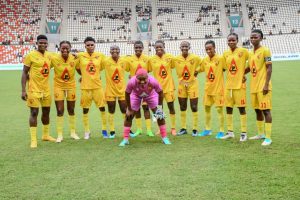By Harry Awurumibe, Africa’s No.1 Women Football Journalist

Mission Impossible… Super Falcons fail to shine in 2024
The Year 2024 could be described as bitter sweet by women’s football followers in Nigeria because none of the three national women’s teams namely the Super Falcons; U-20 side, the Falconets and U-17 team, Flamingos, won any continental or global trophy in the outgoing year.
Also, the country’s representatives in the 4th edition of the CAF Women’s Champions League (WCL) which held in Morocco towards the end of the year, Edo Queens football club failed to win any colour of medal in the elite women’s club competition in Africa.
In the same vein, when it looked like Nigerians will finally celebrate a trophy in 2024 football season, Ghana’s Black Maidens in a dramatic finish edged out Nigeria 5-4 in the penalty shootout in a thrilling final to win the inaugural edition of the West African Football Union (WAFU) Zone B U-17 Girls Cup at the Ghanaman Soccer Centre of Excellence at Prampram, Ghana on December 22, 2024.
The 2024 Christmas eve failure by the Flamingos to win the WAFU Zone B U-17 Girls Cup in Ghana sum up the spate of bad results harvested by the Super Falcons, Falconets, Flamingos and Edo Queens in the CAF and FIFA-organised women’s football competitions in the year under review.
Let’s look at how each team performed in 2024:
SUPER FALCONS PARIS OLYMPICS FLOP REVISITED
The most successful women’s national team in Africa, the Super Falcons started the 2024 in a rather slow pace when the former head coach Randy Waldrum led the team to play out a barren draw with the Indomitable Lionesses of Cameroon in the CAF Women’s Olympics Qualifiers 3rd round first leg match on February 23, 2024 in Yaounde. Three days later, Nigeria laboured to a 1 0 victory over Cameroon in the return tie at Moshood Abiola National Stadium Abuja on February 26, 2024
Also, Nigeria managed to edge out fierce rivals South Africa for the 2024 Paris Olympic Games ticket as the Super Falcons beat Banyana Banyana 1 0 in the first leg final round of the CAF Women’s Olympics Qualifiers on April 5, 2024 at Moshood Abiola National Stadium Abuja. The return leg encounter in Pretoria on April 9, 2024 ended in another barren draw but Nigeria has qualified for the Olympic Games after 16 years hiatus.
However, the euphoria which greeted Nigeria’s qualification for the Olympics did not die down before the Super Falcons were pummeled in the competition proper in France despite the preparations given to the team by the Nigeria Football Federation (NFF) which camped the team in Spain ahead of the Paris Olympics.
The former African champions however flopped big time in France as Nigeria lost her first match on July 25, 2024 to Brazil by a lone goal. Lost the second match to Spain by the same margin on July 27, 2024 before being crushed by the Nadeshiko of Japan 3-1on July 31, 2024 to crash out in the group stage of the competition. Nigeria conceded a total of 5 goals and scored only 1.
Perhaps, the dismal performance of Super Falcons in Paris Olympics where Nigeria lost three matches in a row; conceded a total of five goals and scored only one may have led NFF Board to sack the American-born gaffer Waldrum.
Later in the year, the Federation appointed an indigenous coach, Justin Madugu as interim coach and the Adamawa-born tactician started his reign with three international friendly matches with Algeria and France respectively.
Under Madugu, Nigeria beat Algeria 2-0 in the first of the double-header international friendlies played at Remo Stars Stadium in Ikenne, Ogun state on October 26. 2024 while the second match on October 29, 2024 at Mobolaji Johnson Arena in Lagos saw Nigeria thrash Les Fennecs of Algeria 4 1.
Super Falcons rounded off a poor season with another loss in a high-profile international friendly against Les Bleues at the Stade Raymond Kopa in Angers on November 30, 2024, although Nigeria made history in the 2-1 loss as the African country finally scored against France for the first time after several meetings.
AGAIN, FALCONETS FAILED TO FLY PAST QUARTER-FINAL

Falconets
Like the Super Falcons, Nigeria’s U-20 women’s team, the Falconets were kicked out of the 2024 FIFA U-20 Women’s World Cup in Colombia after a 1-2 loss to the Nadeshiko of Japan on September 13, 2024 at Estadio Metropolitano de Tech in Bogota, Colombia.
By this defeat by Japan, Nigeria’s dream to win the coveted trophy after participating in every edition of the FIFA U-20 Women’s World Cup and finishing runners-up twice by losing to Germany on both occasions, in 2010 and 2014, evaporated like the early morning dew.
Recall the senior Nadeshiko of Japan walloped the Super Falcons 3-1 when both met in the Paris Olympics group stage earlier in the year and there were expectations that the Falconets under the tutelage of Christopher Danjuma Musa will do better than the Super Falcons when they meet their Japanese opponents.
Also, coach Danjuma’s Falconets crashed out in the quarter-final stage of the competition as they did in the past two editions of FIFA U-20 Women’s World Cup finals in France 2018 and Costa Rica in 2022 respectively.
The Nasarawa Amazons’ head coach have always crashed out of the competition in the quarter-final stage and he did not disappoint despite the array of rising stars in the Falconets squad including forwards: Flourish Sabastine (Stade de Reims, France); Aminat Bello (Otero College, USA); Opeyemi Ajakaye (Madrid CFF, Spain) and Chiamaka Okwuchukwu (Rivers Angels) and Mary Nkpa (Heartland Queens).
Others are midfielders Chioma Olise (Edo Queens), Olushola Shobowale (Nasarawa Amazons), Joy Igbokwe (Naija Ratels), Shakirat Oyinlola (La Liga Academy, Spain) and defenders Oluchi Ohaegbulem (Nasarawa Amazons), Shukurat Oladipo (FC Robo Queens), Jumoke Alani (Nasarawa Amazons), Comfort Folorunsho (Edo Queens) and Rofiat Imuran (Unattached).
Sadly, the Falconets failed yet again to make a podium finish in Colombia under coach Danjuma despite raising the hope of many Nigerians that the team will reach the finals this time around to equal the achievements of the 2010 and 2014 sets because of the quality of players in the squad as listed above still flopped.
TWICE FLAMINGOS DISAPPOINT

Flamingos
There is no gainsaying the facts the Flamingos flattered to deceive as the team which scored nine goals and conceded only one goal in the group stage was later bundled out in the quarter final stage in the 2024 FIFA U-17 Women’s World Cup in Dominican Republic.
Following a gutsy performance throughout their campaign, Nigeria bowed out of the World Cup on Saturday, 26 October after succumbing to a 2-0 loss to USA at the Santiago de los Caballeros stadium in the quarter-final clash. This eighth edition of the global event took place from October 16 to November 3, 2024 in the Dominican Republic.
Indeed, the coach Olowookere Bankole-tutored Flamingos performance in Colombia fell short of the expectation of the team which won the Bronze medal two years ago in India where the team made history by edging out Germany in the third-place match via 3-2 on penalty kicks to win a medal for the first time.
This time around, Bankole and his players ran out of ideas as the Flamingos were eliminated from the 2024 FIFA U-17 Women’s World Cup after a 2-0 defeat to the USA in the quarterfinals on Saturday, October 26, 2024. The match was a rematch of the 2022 quarterfinal, where Nigeria had emerged victorious.
Meanwhile, based on their pedigree in the recent FIFA U-17 Women’s World Cup outings in India and Dominican Republic respectively, Nigerians were upbeat that the Flamingos will lift the inaugural WAFU Zone B U-17 Girls Cup this December in Prampram, Ghana.
But it turned out to be a hoax as Bankole-led team again failed to win the coveted trophy as the Black Maidens in a dramatic finish, edged out Flamingos 5-4 in the penalty shootout to claim the WAFU Zone B U17 Girls Cup. The Maidens celebrated their hard-fought victory while the Flamingos returned home with heads bowed and Nigerians denied celebrating any trophy won by our women’s national teams in 2024.
With this harvest of poor results and the inability of any of the three national women’s teams to win trophy of any colour in 2024, time has come for the NFF to restrategise to give impetus to the women’s football teams of Nigeria; it is time to rebuild the Flamingos, Falconets and also fortify the technical department of the teams if the performances of the three teams must improve in 2025.
In deed, the poor results recorded by the Super Falcons in the 2024 Paris Olympics women’s football tournament which was followed by the early ouster of the Falconets and Flamingos in the quarter-final stages of the FIFA U-20 and FIFA U-17 Women’s World Cup finals in Colombia and Dominican Republic call for an urgent surgical operation of the two junior teams.
In fact, Nigeria cannot afford to be operating in analogue way of appointing only three coaches (head and two assistants) when the rest of the world have gone digital with most of the coaches of football teams making use of technology to coach their teams and Federations employing the services of Match Readers or Video Analysts, Performance Coaches and Real-time data analytics as coaches can use real-time analytics during matches to gain an advantage.
Also, Virtual Reality (VR) and Augmented Reality (AR) are now introduced into coaching because players can use VR and AR to simulate game scenarios and practice in a controlled environment. This can help players improve their decision-making, game vision, and reactions in real match situations.
The absence of modern technique in coaching Super Falcons, Falconets and Flamingos are responsible for the poor results the teams have churned out in their continental and global competitions in the recent time as the last time Nigeria won a trophy in women’s football was the back to back WAFCON Cup in 2016 in Cameroon and 2018 in Ghana, a clear six years ago.
The outdated three-man coaching crew without a Psychologists, Performance Coaches, Match Readers or Video Analysts and Real-time data analytic coaches can no longer help Nigerian coaches win trophies at the world stage as talents alone cannot make a player excel at the top level or teams win important matches.
As the Super Falcons prepares for the 2025 WAFCON in Morocco and Flamingos for now yearly FIFA U-17 Women’s World Cup also in Morocco, NFF must surround the teams with experienced technical crew and knowledgeable backroom staff especially those who have something to contribute to the success of the teams and not mere cronies who are attached to the teams to earn estacode only.
In a related development, the NFF should take more than passing interest in the running of the Nigeria Women’s Football League (NWFL) as it has become crystal clear that no Nigerian club side will win the newly introduced CAFWCL trophy with the way the league is organised in Nigeria in the last decade.

Nigeria’s reps in the 4th edition of CAF WCL, Edo Queens
In a situation where a club plays less than 10 matches in a full football league season will not produce a team that can challenge the likes of Mamelodi Sundowns of South Africa ranked 19 in the Women’s Clubs World Rankings till January 2025 and AS FAR of Morocco in the 65 position as well as FC Masar of Egypt and reigning champions Tout Puissant Mazembe otherwise called TP Mazembe Ladies FC of Democratic Republic of Congo.
Nigerian clubs can at best make up the numbers of teams participating in the CAFWCL but cannot upstage Sundowns, AS FAR, Masar and TP Mazembe and other well financed clubs across Africa to win the ultimate trophy in the near future.
This situation should worry the NFF because Nigeria will become a laughing stock if the country can be the best women’s football playing nation in Africa by the intimidating records of the Super Falcons but no club side in the country has won the CAFWCL trophy or finished Runners-up in the competition. Only Bayelsa Queens have finished third in the past.
Although the South African Football Association (SAFA) Women’s League, commonly known as Hollywoodbets Super League, which is in its fifth season of the professional SAFA Women’s League and 3rd season played with 16 teams, each club plays a total of 30 matches in a season unlike the NWFL which is divided into two groups and play abridged league in Nigeria.
This so-called NWFL abridged format which has been in operation in Nigeria for a long time and adopted by the successive managers of the women’s league will not produce a worthy representative of the country in Africa’s elite women’s club competition.




 Sports Revelation Online ..breaking authenic sports reports
Sports Revelation Online ..breaking authenic sports reports